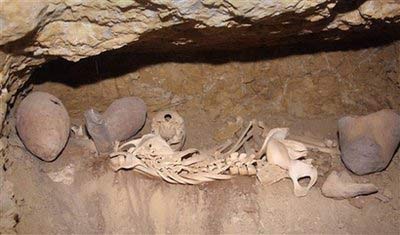中國網(wǎng)站品牌欄目(頻道)
|
 In this undated photo released by the Egyptian Supreme Council of Antiquities on Sunday, January 10, 2010, pottery and bones are seen in a tomb, in Giza, Egypt. Egyptian archaeologists have discovered a new set of tombs of the workers who built the great pyramids, shedding new light on how the laborers lived and ate more than 4,000 years ago, the antiquities department said Sunday. Zahi Hawass, the director of Egypt's Supreme Council of Antiquities, says the tombs are significant because they show that the pyramids were not built by slaves, but rather free workers.(Agencies) |